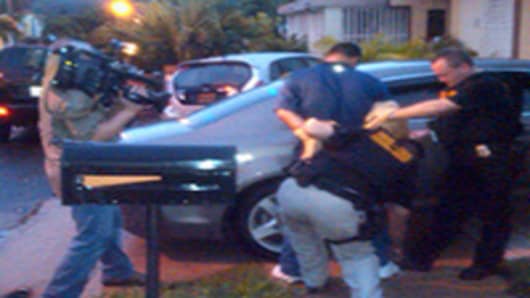SAN JUAN, Puerto Rico — In the pre-dawn hours in a strip mall parking lot on a recent morning, six federal agents and six members of the police department geared up for an arrest in a nearby residential neighborhood. Twelve law enforcers were preparing to take down one individual. And they were armed to the teeth, including high-powered rifles and semi-automatic weapons.
Was it a gang leader? A drug lord?
No, it was an independent sales consultant in the medical equipment business.
This is the modern war against health care fraud—fraud that saps an estimated $80 billion a year from government health programs including Medicare and Medicaid.
The massive pool of money devoted to health care entitlements—roughly $800 billion a year—is attracting a new breed of fraudster, and raising the stakes.
“In the past it was probably, we were dealing with one provider—like, one physician. Now we’re dealing with organized crime, people that have no health care experience whatsoever. And they’re just in it to defraud the system,” said Tom O’Donnell, special agent in charge in the New York regional office of the U.S. Department of Health and Human Services Office of Inspector General(HHS-OIG). “Greed, I think, is the common denominator.”
That may help to explain why federal authorities have begun fighting fire with fire. In 2009, the Obama administration launched an operation it calls “HEAT,” short for Health Care Prevention and Enforcement Action Team. A joint operation of the Justice Department, the Department of Health and Human Servicesand HHS-OIG, HEAT revolves around so-called strike forces in the areas where fraud is most rampant. There are nine strike-force cities: Brooklyn, Chicago, Dallas, Detroit, Houston, Los Angeles, Miami, Tampa, Fla., and Baton Rouge, La.
CNBC Investigations Inc. spent six months with HHS-OIG agents to document the escalating fight against health care fraud for the documentary “Health Care Hustle.”
While much of the agents’ work revolves around newly sophisticated data analysis designed to spot trends and head off fraud before it happens, their work often culminates in dangerous raids more typically associated with drug busts. But O’Donnell says the work he and his team do is not much different.
“Healthcare fraud is a huge problem,” O’Donnell said. “It's like the drug epidemic in the '80s, with crack cocaine. I mean, it's a massive problem.”
O’Donnell’s New York region includes New York City, parts of New Jersey as well as Puerto Rico. The island has only about 92,000 residents eligible for Medicare, but that is enough to support a bustling black market in durable medical equipment—items like wheelchairs, hospital beds and artificial limbs—frequently supplied to patients who don’t need them and billed to the government.
HHS-OIG has beefed up its staff here, and is starting to get results.
Since the crackdown began in 2009, Medicare payments for durable medical equipment in Puerto Rico are down 36 percent, according Safeguard Services, a private company that monitors claims under a multi-year contract with the U.S. Center for Medicare and Medicaid Services. Medicare paid $20.5 million for durable medical equipment in Puerto Rico in 2011, down from $46.5 million in 2008.
Nationwide, authorities say the HEAT initiative is paying huge dividends, including a record $4.1 billion recovered in 2011 alone.
“We’ve hired more agents, we used more data, and were doing faster prosecutions,” O’Donnell said.
But as the feds turn up the heat, the criminals are doing the same.
“A lot of people, the subjects have weapons,” O’Donnell said. “Registered, sometimes unregistered, weapons. And that’s why we deploy rifles and train so much with guns, and defensive tactics.”
Assistant Special Agent in Charge Keith Gordon, a former Army Ranger and Border Patrol agent, is part of O’Donnell’s team.
“We always train for the unexpected,” Gordon said. “You just assume everyone is dangerous. That’s the safest way to proceed.”
It is a wise course. Shotguns, semi-automatic rifles, pistols, even nunchucks and throwing stars have been confiscated in previous raids.
“It's getting more dangerous,” O’Donnell said. “We haven't had anyone killed, knock on wood, because tactically, we train. We train like it's real.”
At the raid in Puerto Rico, the subject was arrested without incident—one of 10 arrests on the island that morning alone in an alleged multi-million dollar fraud ring. But in his home, authorities said they found a cache of weapons including a .22-caliber rifle outfitted with a silencer.
While it is unclear whether the guns were used in his business, they were confiscated as required by local laws.




